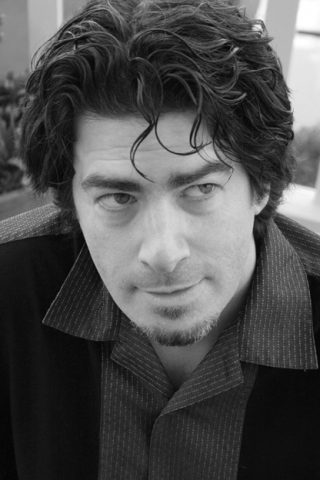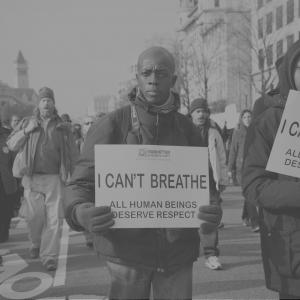
Derek Flood is the author of Disarming Scripture: Cherry-Picking Liberals, Violence-Loving Conservatives, and Why We All Need to Learn to Read the Bible Like Jesus Did. He is a featured blogger for the Huffington Post, Red Letter Christians, and writes regularly at his website theRebelGod.com. A longtime voice in the post-conservative evangelical movement, Derek’s focus is on wrestling with questions of faith and doubt, violence in the Bible, relational theology, and understanding the cross from the perspective of grace and restorative justice.
Posts By This Author
The Dangerous Rise of American Authoritarianism

Image via Mopic/Shutterstock.com
It is not a particular religious or political set of values or ideology that is the heart of the problem here. Authoritarianism goes beyond political or religious affiliation.
Given authoritarianism's penchant for enforcing its will through the means of coercion and force, at the expense of religious and civil liberties, it is vital for those who identify with these groups to recognize this, and the very real danger that this poses.
It is not enough for progressive evangelicals and political liberals or even moderates to speak out. Conservative politicians and religious leaders alike need to recognize the very real danger of authoritarianism, and find the moral courage to speak out against it.
Confessing Our Cotton Candy Christianity
A Book Review of Brian Zahnd's 'Water to Wine'
So what characterizes a Christianity that has been “Americanized?" Zahnd focuses on the two core American values of consumerism and militarism, which had shaped his own faith. A Christianity that is driven by the value of consumerism translates into a self-focused pursuit of wealth and happiness. For Zahnd that meant adopting the word-of-faith of the gospel.
When Psychology Is Used For Torture

Image via Janaka Dharmasena/Shutterstock
An independent report commissioned by the American Psychological Association (APA) has found that the association secretly colluded with the Department of Defense and the CIA to weaken the APA’s ethical guidelines and allow psychologists to take part in government torture programs under the Bush administration post-9/11.
What Was So Amazing About 'Amazing Grace'
The president sang about grace — and slavery, systemic racism, and forgiveness.

Image via Nemeziya/Shutterstock.
Amazing Grace is a song about repenting of systemic sin. We typically think of sin in individual terms, as personal failings. Systemic sin is often not on our radar at all, but it needs to be. They say "all sins are the same in God's eyes," but that simply isn't true. Newton's involvement in the slave trade clearly affected and damaged more lives than any of his individual failings could have. What makes it all the worse is that systemic sin often hides under the mantle of political or religious authority, claiming as the system to represent "the good." That is the nature of systemic sin, and it is indeed wretched.
Why Jesus Would Say 'Black Lives Matter'
As Christians we should recognize the language of black lives matter. After all, Jesus did not say "blessed is everyone," but "blessed are the poor" (Luke 6:20). He did not say "as you do it unto everyone, you do it unto me," but "as you do it unto the least" (Matthew 25:40). Jesus did not say "love everyone," but "love your enemies" (Matthew 5:44).
Continually Jesus drew our attention not to loving people "in general" but to specifically caring for those we would tend to discount or condemn. Black lives matter is exactly the kind of thing Jesus would say.
Torture, the Bible, and America's Faith in Violence
Does the Bible describe a God of love or a God of genocide? How are we to reconcile that the apparent answer to this question is that it describes both? As people of faith, we need to face the sobering fact that some parts of our Bible command us to love our enemies, while other parts command mercilessly slaughtering them. If the Bible is God's Word, how can it present such starkly contrasting visions of who God is, and what faithfulness to God entails?
The typical response among conservative Christians is to seek to justify violence as good in an attempt to defend the Bible. This tendency to defend violence becomes especially relevant in the wake of the Senate report on the CIA's use of torture. While the report was met with shock and outrage in some quarters, it was also defended by a good number of conservative Evangelical Christians. In fact, a 2009 Pew Research poll found that 6-in-10 white Evangelicals support the government's use of torture.
Politicians defend torture in the name of "justice" and "defense," while conservative Christians speak in the more religious language of "God's will," citing biblical texts for support. In the end, however, the same point is being made. Whether it is described in the vocabulary of religion or more "secular" terms, violence — and in the case of torture, shockingly inhumane violence — is described as a necessary means for bringing about the good. This logic is at the heart of all religious violence, and it is a view that is alive and well today.
On the other hand, the typical liberal Christian response to the violence in the Bible is to act as if it were not there. One speaks of Christianity as a "religion of love," and points to the many parts of the Bible that speak of caring for the poor and the stranger.
Ferguson and America’s Love Affair with Violence
In Ferguson, an unarmed black teenager was killed by police. In reaction, thousands took to the streets in protest. However, rather than attempting to listen, the heavily militarized police immediately made a show of force with armored vehicles, assault rifles, riot gear, and tear gas. People tweeted photos and videos more reminiscent of scenes from Baghdad or Fallujah than of a little Midwestern suburb in America.
Tear gas and rubber bullets were fired into the crowd of peaceful protestors. Multiple reporters were assaulted and arrested. One cop was caught on video screaming “Bring it, all you f---ing animals! Bring it!” Another appeared to be indiscriminately pointing his rifle in people’s faces and yelling “I will f---ing kill you!”
This raises the question: Is what we saw night after night in Ferguson simply a matter of a few “bad apple” cops, a local isolated problem? Or is it indicative of a wider attitude of the police in relation to the use of violence and force? Is it an anomaly, or is this what police in fact consider normal and right? In an op-ed piece in the Washington Post, a 17-year veteran of the LAPD gives us what he believes to be good advice from the perspective of a cop:
“If you don’t want to get shot, tased, pepper-sprayed, struck with a baton or thrown to the ground, just do what I tell you. Don’t argue with me ... and don’t even think of aggressively walking towards me. ”
In one sense he is of course right. If a guy has a gun at your head you should definitely not argue, and just do what he says. But one is led to ask how this reasoning is substantially different from saying to a child, “Honey, when dad is drunk and gets mad, don’t talk back, just be real quiet.” That’s probably sound advice, too, but it begs the question: Is this the world we want to live in? Is that as good as we can do?
Is There a Nonviolent Response to ISIS?
Alarm and outrage has been growing over the mounting humanitarian crisis in Iraq at the hands of the Islamic State (IS) also known as ISIL (Islamic State of Syria and the Levant) or ISIS (Islamic State of Iraq and Syria).
Christians in the region are being forced to convert, pay tribute or die as the al Qaeda breakaway group sweeps into predominantly Christian villages and Hamlets in Iraq, sending tens of thousands fleeing for their lives. Other non-Muslim groups, in particular the Yazidi, who practice a faith that predates Islam, are reportedly considered as infidels by the fanatic Islamic State and targeted for extermination in what many are calling a genocide. The U.N. is still gathering numbers but it believes that hundreds of Yazidis have been killed while others, primarily women, have been abducted and taken into slavery. Around 40,000 Yazidis have fled into the mountains of Northwest Iraq where they face the prospect of starvation on mountain or massacre by the Islamic State militants below.
The news is devastating and overwhelming. The suffering and acts of brutal violence staggers the imagination. What would a nonviolent response look like?
Pasta and Peacemaking: Learning Nonviolence from My Kids
So my son comes marching into the kitchen, and says in a demanding tone, "Make me snacks now!" My first reaction is to think that this is simply unacceptable behavior, and that he needs a good talking to. But I also notice that I am quite triggered by this, and that before I do anything, I need to reflect.
So I start boiling water for some pasta (I do have enough sense to know that when he asks for a snack that what his body really needs is some healthy food and not junk). As the water boils it dawns on me why he was so rude. In a word: metabolism.
It's amazing to me how much of our spiritual and emotional problems have clear biological and physical causes. The reason he was so demanding is that his body was hungry, and so his brain went into alarm mode:
I need food NOW .
The problem is not that he is a rude kid, it's that his metabolism was flooding his brain. If I had scolded him this would have had the effect of riling up his brain even more, which was already in freakout mode (I'll leave it to a neurobiologist to explain this with big $10 words like amygdala and cerebral cortex, but the basic science here is quite solid).
Sin, Guilt, and Psychology: What I Wish All Pastors Knew
Our culture's shift around its relationship to shame and guilt can be traced to the broad influence that psychology has had on Western culture over the past century. That is, the reason we have become so sensitized to guilt and shame today in our culture comes from the practical insights of psychologists: As they worked to help people face their hurtful and dysfunctional behaviors, psychotherapists observed that their attempts to help were often met with resistance. Early on Freud referred to this phenomenon as "denial," but regardless of the terminology we use, this is a dynamic therapists have recognized over and over and again because it is, quite simply, one of the most basic elements of human psychology: When we feel threatened we get defensive.
As a result of this dynamic, psychotherapists have found that people actually have struggles on two simultaneous fronts: One struggle is with their negative behavior patterns that hurt themselves and others. The other struggle is the feelings of shame and self-hatred that often accompany these. In fact, the two are frequently intertwined in a destructive spiral where feelings of shame lead to doing things to dull that emotional pain, which then lead to more feelings of shame, and round and round it goes.
Questioning the Bible: What I Would Have Said to Bill Maher
Sojourners president Jim Wallis was recently a guest on HBO's "Real Time with Bill Maher." In the course of the show Maher confronted Wallis on the Bible, asking him some very pointed questions about some of its more troubling texts. You can watch the exchange HERE.
Maher asks, "How do you reconcile this idea that it all comes from the Bible, but the Bible is so flawed... I mean, it's just so full of either nonsense or viciousness." In response, Wallis steered the conversation back to the topic of social justice and compassion, often overlooked Biblical mandates. Maher objected several times, accusing Wallis of "cherry-picking the good parts" of the Bible while ignoring the bad parts.
I'm a big fan of Jim Wallis (heck, I blog for Sojourners!), and I appreciate that he moved the conversation away from Maher's attempted divisiveness and back to caring for the poor and immigration reform in this country. He's totally right that caring for the marginalized should be the priority of us Christians, and I understand that he wanted to stay focused on that.
At the same time, I think the question Bill Maher was raising is an important one, too, because it ultimately has to do with caring for the marginalized as well. That is, when the Bible is read in a hurtful way, it can and has been used throughout history to justify horrendous violence and mistreatment. That matters, and consequently it matters how we read the Bible. So as someone who has focused on confronting those "bad parts" in Scripture, I wanted to take a stab at addressing Maher's questions.
'Paranorman:' Unmasking the Myth of Redemptive Violence with Cartoon Zombies
Paranorman, the stop-motion animated feature by Laika Studios just came out on Netflix instant download, so we decided to watch it for our family movie night. It's a fun film, perhaps a bit too scary for the little ones, but what really stood out for me was the surprisingly deep morality in this little film. This comes in an unlikely package since the film is about zombies and witches. Not surprisingly, if you look for Christian reviews of the film you will see many focus on warnings to stay way from the occult. Sadly, this response misses the profoundly deep moral message behind this film — one that confronts religious violence, and instead promotes a message of redemption and forgiveness. That's quite a bit of insight for a cartoon!
The premise of Paranorman is that the town of Blithe Hollow (not coincidentally set in Massachusetts, as we will see later) is about to be overrun by zombies because of the curse of an evil witch. Only Norman Babcock, an odd boy who can speak to the dead, can save the day. The movie begins by having us get to know Norman, who is emotionally isolated because his family does not understand him, and his peers ostracize and ridicule him as a "freak" at school. The only person who believes Norman is his friend Neil Downe, and overweight boy who is himself bullied.
The town is in peril because three centuries ago, an evil witch was executed, and in revenge put a curse on puritan judge and her accusers, cursing them to rise from the grave as zombies. So each year the curse of the witch must be appeased by reading from a mysterious book at the grave of the witch in order to prevent a zombie apocalypse. But this year that does not happen, and the zombies overrun the town. The townspeople and local police form the typical Frankenstein mob, complete with pitchforks and shotguns to kill the zombies. As the mob mentality grows, Norman and his motley band are threatened by the mob as well.
This is the first point where we see the film’s unmasking of "virtuous" violence: in the logic of many films, so long as someone is a "monster" or an "alien," it is okay to kill them. So we have no problem with watching mass killings of monsters or aliens in movies because ... well ... they're monsters. So you're supposed to kill them. That's what good guys do in movies. This is the unquestioned plot of hundreds of movies. As long as the Storm Troopers in Star Wars are faceless, we don't bat an eye when Luke kills one after the other. They have been dehumanized, and so it's okay to kill them all. The same is true for the Orks in Lord of the Rings, or the witch and her minions in the Chronicles of Narnia.
How To Really Support Our Troops
A 10-year-old boy holding a grenade approaches a group of soldiers. He does not respond to their shouts. One shoots him with his M-16 and the boy crumbles to the ground, dead.
Did he have a choice? It was do or die, kill or be killed. Still he killed a little boy, and those images still haunt him.
This is a classic example of psychological trauma: A person is put in horrific life-threatening situation where they do not feel they have control. That's the situation he found himself in. It was a no-win scenario — kill a little boy or have you and your friends all die.
Soldier suicides have reached epidemic numbers. As the AP reports, More soldiers are taking their own lives than are falling in battle. Add on top of that, the many who suffer from PTSD, and who as a result find themselves estranged from their home, their loved ones, and indeed from themselves.
Healing the Gospel: Did Jesus Die to Save Us From God?
Why did Jesus have to die? Was it to appease a wrathful God's demand for punishment? Does that mean Jesus died to save us from God? How could someone ever truly love or trust a God like that? How can that ever be called "Good News?"
It's questions like these that make so many people want to have nothing to do with Christianity.
Countless people filling our pews have adopted this hurtful view of God and themselves. It has led many to internalize feelings of shame and self-loathing, thinking this is what God desires. Others have lost their faith entirely because of it, unable to worship a God who seems to them to be a moral monster. Faith motivated by fear, threat, and feelings of worthlessness. How could things have gone so wrong?
When did the good news become bad news?
Gender Equality: Why The Gospel Coalition Misses the Gospel
I was watching this recent video where Tim Keller (along with Don Carson and John Piper) addresses why The Gospel Coalition is explicitly complementarian (a nice way to say that they don't believe in gender equality). Why do they see this as something that a group that is supposed to be focused on the Gospel would need to stress?
Keller begins by saying that he does not think the issue of gender roles are directly part of the Gospel, and acknowledges that bringing it up in the context of answering a person's questions of what it would mean to be a Christian could "certainly muddy the waters."
So why the focus then? He says it has to do with how we read Scripture.
Reconciling Faith and (Social) Science
Biblical literalism, and the corresponding idea of the inerrancy of scripture, has been bumping up against the sciences for a long time.
Way back in the Renaissance, the church insisted that the Bible taught that the sun revolved around the earth, and charged Galileo with heresy for claiming otherwise. Today, the debate between the Bible and natural science continues, most notably in the evolution/creation debate.
While discussions of religion and science usually revolve around conflicts with natural science, I'd like to propose that the place we really should be placing our attention is the relationship between faith and the social sciences.
As our understanding of all science grows, it becomes harder and harder to maintain the position of biblical literalism without seeming absurd.
Maybe we haven't all heard the thunder clap yet, but the lightning bolt struck a while ago. We are going to have to adjust our reading of the Bible to coincide with a modern scientific understanding of the universe. In broad strokes, that shift has already happened.
Hellbound? New Film Explores Ideas, Doctrine of Hell
The film picks up on the recent media buzz generated by Rob Bell's controversial bestselling-book Love Wins, taking that debate into new levels of intelligence and depth.
Like any good documentary, we have the entertaining attention grabbing parts, which aren't hard to find when your topic is Hell and damnation:
We meet people at a death metal concert, take a tour through "Hell House" where actors attempt to traumatize teens into the kingdom by reenacting scenes from Columbine. Then there are the street interviews with the rather obviously mentally unstable and angry folks from Fred Phelps' church, holding their "God Hates Fags" signs and screaming at anyone who passes by.
The movie quickly moves beyond this however, delving into the deeper issues at hand. Unlike so many other Christian films, Hellbound? is neither sentimental nor sensationalist. The word that comes to mind instead is depth.
Sin and Chewing Gum
Yesterday, I was walking through Dolores Park and heard a street preacher, saying "If you've ever stolen a stick of gum, then you are guilty of sin! If you've ever looked at Facebook at work, then you've stolen from your employer, and that's sin!"
Of course we all know where he was headed: If we have sinned—even with a trivial infraction like a stick of gum—then God who is holy must punish us for all eternity in Hell unless we accept Jesus right now.
I mean, seriously, gum? Why can't God just get over it? Is God less moral than all of us are? This is not a picture of holiness, it is a picture of a petty tyrant. Aside from the horrible picture of God that this gives us (and honestly, who could ever love, trust, and feel safe around a God like that?), what this ultimately does is trivialize sin. It makes sin into a petty infraction of little consequence.
Ending Poverty in Our Time
Hearing about the injustice and suffering in our world can be overwhelming. The problems seem so insurmountable. Is it really possible to make a difference?
Well, here's some good news. We already are making a big difference. Consider these statistics cited by Dr. Scott Todd from Live58:
"We used to say that 40,000 children die each day from preventable causes. In the 1990s, that number dropped to 33,000 per day. By 2008, it dropped again to 24,000. Now it is down to 21,000. That means that in a generation we cut that number in half. 1.4 billion people live in extreme poverty today. That's a staggering amount, but let's put those numbers in perspective: In 1981, 52 percent of the world lived in extreme poverty. Today it's 26 percent. Again, that means we have cut the number in half, and we did it in one generation."
Now, if you are anything like me then your reaction to poverty is a mixture of compassion and helplessness. If you're reading the Sojourners blog, then I assume that you already care about the least like I do, and that you know how big the problems are. I often find myself asking: What can I do? What can anyone do? We've heard the bleak statistics before. It's not news that there is a problem.
The news is that there is actually hope for real change.
Standing at the Gates: A Confession

Sign for the confessional at Lourdes. Via Wiki Commons http://bit.ly/s71Wf2
Everybody needs forgiveness.
But it’s hard to face that. It feels threatening, like an accusation. So we tend to get defensive and start justifying ourselves, rather than seeing the one we’ve hurt.
If we’re honest, though, we all know that we’ve done things that have hurt others. Probably lots of things.















